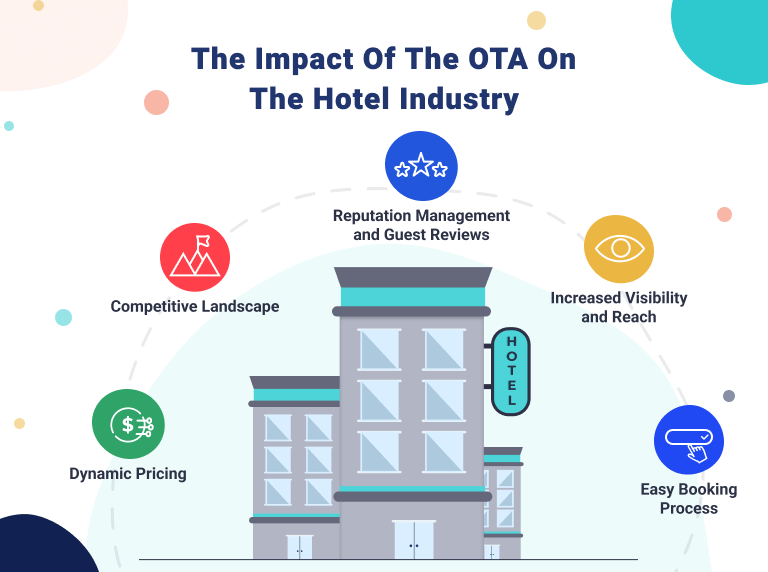The rise of OTAs has recast the hotel industry, offering new prospects and challenges for hotels. These platforms have provided increased visibility, ease of the booking processes, and data-driven pricing strategies.
While OTAs have surely brought multiple benefits to both travelers and hotels. Their impact on the hotel industry is a complex topic. In this blog post, we will explore The Impact Of The OTA On The Hotel Industry and delve into the prospects and challenges they present.
What is an Online Travel Agency?
An Online Travel Agency (or OTA) is a platform that allows travelers to book hotels, flights, cabs, and other travel-related services online.
OTA acts as a mediator between travelers and hotels. Providing a platform where travelers can search for available deals, compare prices and services, read reviews, and make bookings. They collect information from various hotels and present it in a user-friendly way to travelers. This makes it easier for travelers to find and book suitable deals.
Hotels partner with OTAs to reach a wider audience and increase their online visibility. By listing their properties on OTAs, hotels can attract more guests and increase their bookings. OTAs often charge hotels a commission or a fee for each booking made through their platform.
While OTAs provide comfort and a wide selection of options for travelers. They can also have certain effects on hotels. Hotels sometimes have to compete with each other on price and offer lower rates on OTAs, which can affect their profits.
Overall, OTAs play a significant role in the hotel industry. By connecting travelers with the hotel’s best deals and easing the hotel booking process through their online platforms.

Impact Of The OTA On The Hotel Industry
Let’s discuss the Impact Of The OTA On The Hotel Industry.
Increased Visibility and Reach
One of the most significant benefits of the OTA On The Hotel Industry is increased visibility and reach. These platforms serve as powerful marketing channels. Exposing hotels to a global audience that they may not have been able to reach alone.
By listing their properties on OTAs, hotels can tap into a vast network of potential guests. Expanding their customer base and maximizing occupancy rates.
Moreover, OTAs invest heavily in search engine optimization (SEO) and online advertising, further improving the visibility of partner hotels.
Simplified Booking Process
OTAs have recast the hotel booking process, making it more suitable and handy for travelers. Gone are the days when travelers had to rely only on phone calls or walk-ins to make a hotel booking.
With just a few clicks, travelers can now compare prices, read reviews, and book their desired deals through OTAs. This easy booking process has not only boosted comfort for guests. But has also increased booking efficiency for hotels by reducing the need for vast manual reservation management
Dynamic Pricing and Revenue Management
OTAs have also played a significant role in shaping the pricing within the hotel industry. These platforms have empowered hotels to adopt dynamic pricing models by giving real-time data and analytics.
Dynamic pricing allows hotels to adjust room rates based on the factors. Like demand, season, and rival rates. OTA’s access to market intelligence and booking trends enables hotels to make data-driven decisions to maximize profit.
Competitive Landscape
While OTAs offer definite benefits, they have also introduced new challenges for hotels. The increased visibility provided by OTAs has boosted the competition within the industry.
Hotels now find themselves vying for guest’s attention among a vast array of options. Leading to reduced customer loyalty and increased pressure to contrast themselves.
Moreover, hotels often have to pay commissions to OTAs for bookings made through their platforms, impacting their profit margins. Striking a balance between the benefits of OTA exposure and the associated costs is a key challenge for hotels.
Reputation Management and Guest Reviews
OTAs have allowed travelers to share their experiences through guest reviews and ratings. While this can be helpful for hotels with positive feedback. It also means that negative reviews can have a slightly bad impact on a hotel’s reputation. Maintaining hotel reputation and managing guest reviews have become crucial for hotels in the era of OTAs.
Conclusion
The rise of OTAs has reshaped the hotel industry, offering new prospects and challenges for the hotels. These platforms have provided increased visibility, simplified booking process, and dynamic pricing. On the other hand, OTA reduces the profit margins of hotels by charging OTA commission rates on each booking and increases the competition within the industry.
Get In Touch With Us!
If you are a hotel owner looking for hotel booking software. Then QloApps: Free hotel booking software can help you.
QloApps offers various features to enhance your hotel business. Such as Virtual tours, Tours and Packages, Channel Manager, Front Desk, Cloud PMS, 100+ Add-ons, and many more.
To get started with this user-friendly software. Just download it and add your property on QloApps.
If you have any suggestions, you can share them on the QloApps forum.
For any technical assistance, kindly raise a ticket.

Be the first to comment.